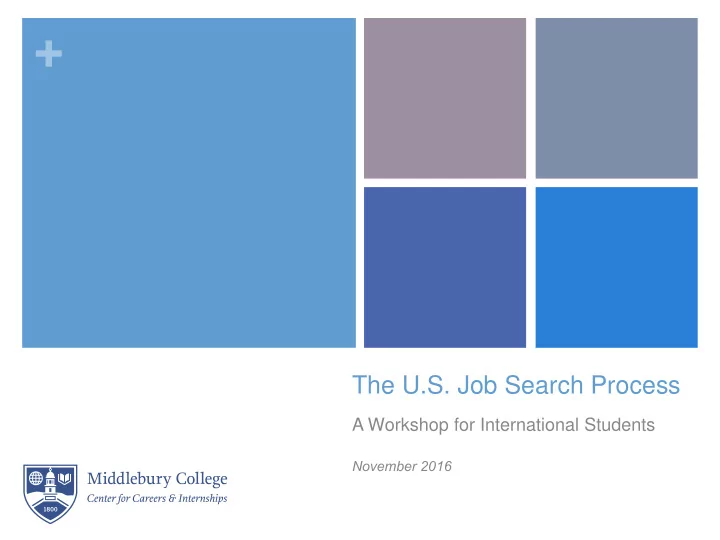

+ The U.S. Job Search Process A Workshop for International Students November 2016
+ Our Agenda Tips & Tools for Success REALITIES you’ll face in the job search Suggestions for PREPARATION U.S. employers EXPECTATIONS RESOURCES and TOOLS
+ Realities that you’ll face & must navigate: Visa Restrictions & Hiring Complexities Visa status can restrict and reduce opportunities To hire you, and employer must: obtain approval from the U.S. Department of Labor petition U.S. Citizen & Immigration Services for an H1-B visa hire an attorney and absorb all associated fees The state of the job market impacts the willingness and ability of employers to sponsor international students
+ Realities that you’ll face & must navigate: Cultural Barriers Cultural barriers exist no matter how long you’ve been in the US so work with your CCI advisors to identify their impact It’s important to understand differences in U.S. workplace culture Interviewing: expectations, appropriate dress, assertiveness and self-promotion, language barriers, punctuality, eye contact, etc. Networking: norms/differences when reaching out to alumni without a formal introduction
+ Preparing for your job search Tell Your Story Determine your job focus – industries and functions Thoroughly review job descriptions Know your strengths and weaknesses Be able to communicate why you are a good match for the organization and role Resume, cover letter, networking, interviewing, negotiation, etc.
+ Preparing for your job search Networking Determine where you need support Fine-tuning resume, interview practice, types of jobs, workplace culture, etc. Develop your contact lists Start with Friends, Faculty, Family, MiddNet and LinkedIn Identify common connections and shared interests Build relationships Outreach etiquette (email, phone, follow-up) Know expectations regarding “time” and “formality” Track progress
+ Applications and Interviews U.S. Employers Expectations Application: connect resume and cover letter to job description Research: familiarize yourself with organizational culture and practices Interview: anticipate questions you might be asked and practice Communicate: convey pride in your accomplishments as part of your story Status: be able to articulate the benefits and restrictions of your particular status
+ Applications and Interviews Interview Tips Arrive early for interviews (at least 10-15 minutes) Treat everyone you meet with respect , regardless of their title or level in the organization Be mindful of your non-verbal communications : give a firm handshake to show confidence; maintain direct eye contact; respect personal space; dress appropriately Self-promotion is expected Be prepared to ask questions during networking conversations and interviews
+ Applications and Interviews U.S. Employers Expectations Emphasize the advantages that come with being an international student Language and cross-cultural communication skills can be an asset You’ve demonstrated initiative , resourcefulness, and adaptability while studying away from your home country – skills employers value in candidates. REMINDER: In the US, it is illegal for employers to ask questions on immigration status, age, nationality, or marital status. They can ask if you are legally authorized to work (permanently) in the U.S.
+ Realities that you must navigate: visa restrictions & hiring complexities Tips on approaching the topic of H1-B Visas with employers Many employers are intimidated by the U.S. immigration process and hesitate to sponsor international students do not begin an employment interview or letter with an inquiry regarding H1-B sponsorship discussions about H1-B sponsorship should come later, either when the employer brings it up or when you’re offered a position your first task in an interview is to convince the employer of your suitability for the job only later, when an employer is close to making or has made an offer, should you raise the H1-B sponsorship issue
+ Resources and Tools CCI online job search resources : MOJO, US Department of Labor database, Idealist, etc. Working for international companies – US multinationals and international companies are looking for language skills, knowledge of overseas economies, and multicultural competencies Networking! Networking! Networking! -- It’s not necessarily who THEY are, but who they KNOW! U.S. Department of Labor Database — a large database listing employers who have applied for H-1B visas on behalf of international employees. Users can search the database by employer name, occupation family, and state. My Visa Jobs --Information about employers that sponsor for a visa.
+ Questions? Center for Careers & Internship – GO/CCI Ursula Olender - Director of Career Advising Nadine Barnicle - Associate Director, Social Impact Career Advising
Recommend
More recommend